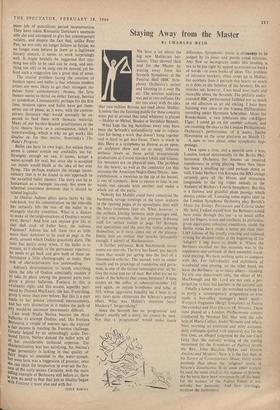Gilt Indeed
Reflections on Science and Human Affairs By EUGENE RABINOWITCH
A selection of essays, some hitherto unpublished, in which one of the most eloquent voices of the scientific world explains the implications of the atomic age he helped to initiate.
52s. net
The History of Philosophy By EMILE BREHIER
A translation by Joseph Thomas of the first part of Brehier's monumental work including chapters on the Pre-Socratics, Socrates, Plato and the Academy and Aristotle and the Lyceum.
50s. net
THE ECONOMIC HISTORY OF MODERN ITALY
By SHEPARD B. CLOUGH
Professor Clough follows in detail the economic progress of Italy since its re-unilication to the present, including important chapters on recon- struction and development alter the Second World War.
72s. ne.
AN INTRODUCTION TO BRAZIL
By CHARLES WAGLEY
Weaving together the threads of social, racial, economic and colonial development, Professor Wagley gives a comprehensive account of the evolution of Brazil as a nation and of Brazilians as people.
44s. 6d. net
POEMS ON AFFAIRS OF STATE
Augustan Satirical Verse 1660-1714 Volume 1 Edited by G. DEFOREST LORD
The most important pieces, published and un- published, providing an inexhaustible and minute record of events from the restoration of Charles to the Popish Plot of 1678.
Theatre, 'A' certificate.) WHEN people say 'What film shall I see?' without qualifying it it's rather like saying 'What shall I wear?' without telling you whether they're going to a wedding or a wake. What do they want, for goodnessake, from that particular even- ing? A spiritual shake-up, an intellectual prod, a guffaw, a good cry, or a background flicker to a social occasion?
Stanley Donen's Charade is one of those con- venient and prettily packaged films you can recommend for almost any occasion in the way you can recommend a box of chocolates as a Christmas present for practically anyone (except your nearest and dearest and anyone else you feel it might, with its diffused acceptability, rather offend). Skilful and often funny, occasionally charming and hardly ever (in spite of five brutal close-up killings) actually offensive, its gloss is so high you can see in it your own eyes popping as Cary Grant (sixty, I believe, last year) leaps about the roof tops or gently repels the advances of a heroine who, at about three decades' distance, shows no more than he does the passing of time.
It is a comedy-thriller, which is what most (written) detective stories are, and means'. that you laugh at what's too preposterous or too re- mote to cry or care about, the characters being stylised enough for their situations to leave you untouched; and in this case the plot is so confused and almost everyone's identity so hard to estab- lish that sympathy is removed a further degree or two by ambiguity. Somewhere about her person or hotel room a woman is hiding a quarter of a million dollars; but where, neither she nor any of the five men after it has the remotest idea. Like most well-hidden things, it's under their noses; they see it, handle it, shove it in and out of a hold- all half a dozen times. Meantime, as happens in most thrillers, suspects and searchers are gradually being eliminated. till only one seems left. A chase and grand climax with some discreet Parisian backgrounds follow, but even then you're left puzzling: the coup de theatre (and the hero's fourth alias) is kept for the last few minutes.
Heartless as an acrostic, the film might have managed its own brand of grisly gaiety if it had kept strictly to the rules and had a heroine to match. But it has Audrey Hepburn as its heroine and she doesn't know the rules. Her playing in comedy (paradoxically enough) is exquisite : but something beyond her playing is wrong: we feel with her, we actually like her, and the thought of her being hooked on the pincers of the handless villain or murdered, like those around her, in a lift-shaft, a bath or a plastic bag is just disturbing enough to bother, like a bit of grit on the eyeball, one's cool, uncommitted enjoyment. Miss Hep- burn, I have a theory, is one of the few great- stars-Inc/noes, not a great actress but someone with the individuality that makes a 'star' in the strictly film sense; an individuality that makes her the original from which cults and copies are taken. In Charade she shines too sweetly for her surroundings, like a candle flame among neon signs, showing them and herself up as unsuitable for each other's company. She makes the film much more lively and interesting than it would have been without her; she also spoils it as a
consistent, plushy success. ISAIWL QUIGLY .


































 Previous page
Previous page